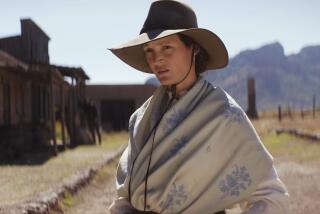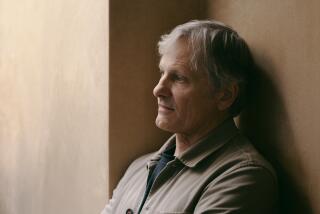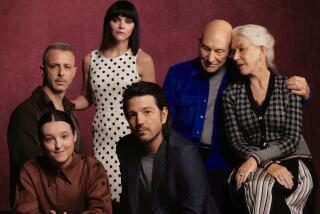Master of the dastardly
- Share via
Ian McSHANE, who plays saloon owner Al Swearengen in the HBO series “Deadwood,” is the sort of actor who’s been in a great many movies, some of which he frankly hasn’t seen. Like “Agent Cody Banks,” the kid-caper movie starring Frankie Muniz that came out last year.
“Why would I see it?” McShane said the other day. He wasn’t being arch, just matter-of-fact. The director, McShane said, was lovely. “I know I was fine in it, playing this sort of mad brinkman. Frankie I found enormously funny. All he talked about was his cars, you know. ‘I got an Escaladian.’ I said, ‘What the ... is that?’ He said, ‘It’s this big Cadillac.’ I said, ‘What do you need that for?’ ”
On “Deadwood,” McShane inhabits Swearengen’s barbarous nature so fully that it can be strange to have a conversation with the actor, who turns out to be a witty, rakish fellow who’s played it all in his career, from Benjamin Disraeli on “Masterpiece Theatre” to Ava Gardner’s lover, in the only movie Roddy McDowall directed, the 1970 horror film “Tam Lin.”
As in Swearengen, there is dark humor in McShane. He will tell you that some of the things he’s done have been awful, but also that there was this check at the end. “Sexy Beast,” the independent film that came out three years ago, now that was a nice surprise. He came on screen in the last half-hour; he was the steely mobster Teddy Bass. He shot a banker in the head and then dropped the main character off at the airport.
“Everybody in the business loved that movie,” McShane said. “Suddenly you’re getting calls from a different area.”
He then did “The Witches of Eastwick,” a blockbuster musical, in London’s West End. He was the devil. The show was not entirely well-received, and McShane left after nine months.
“Taught me a lot,” he said. “Taught me never to do a musical again.”
Now he is taking a break from working, because on “Deadwood,” which airs Sunday nights at 10, after “The Sopranos,” he has found not only a part worth savoring but one that might finally raise his profile, at age 61, here in the States. The lion not yet in winter.
In his native England, McShane has experienced TV stardom -- on “Lovejoy,” which came on the air in 1986 and then again from 1991- to ‘94, with McShane starring as an antiques dealer-rogue. By then, his CV was already somewhat exhaustive. Trained at the Royal Academy of Dramatic Art. Lots of London theater. Played Hal in Joe Orton’s “Loot” in 1965, touring for six weeks in England, Orton in the rafters during rehearsals rewriting.
Asked if he watched Bravo’s “Inside the Actors Studio,” McShane made a face.
“For five years, I just lived wherever,” he said. He was talking about a period in the 1980s. Over the years there have been three marriages, two children -- and now, nearly two decades of sobriety.
“I kept a car here, with the suitcase in the back,” he continued. “And I’d just come back here and check into one of those motels on Hollywood Boulevard, and I’d do the film, I’d do the job, and I’d leave.” By the mid-’90s he and his wife had a place in West Hollywood, in the same building as Gray Davis, who was state controller then. Their relationship entailed salutations in the lobby. It was Gray Davis, controller, after all. “ ‘Good morning, Gray,’ ” McShane said, imitating a bright British tone. “ ‘Morning, Gray.’ ”
There are, then, two McShanes: The accomplished workhorse of stage and screen and the McShane who is a revelation to American audiences as a kind of Tony Soprano of the Old West.
Swearengen, based on an actual person, runs the Gem Saloon, which is full service for the gold rush era. He peddles prostitutes, booze, drugs, gambling. Canned peaches, if Swearengen’s in a bountiful mood, which isn’t that often. Much of what McShane gives the character is seen in the way Swearengen comports himself; in the morning, he climbs out of the bed he shares with the prostitute-girlfriend he both loves and abuses and begins barking complaints at her as he urinates into a bedside pan, pulling his suspenders over his thermals. The rest of the day and night is spent trying to control his little fiefdom -- the Gem, but also the ungoverned camp of Deadwood in South Dakota, Swearengen its de facto mob boss.
The show’s comprehensive profanities, by now a calling card, are often best expressed via Swearengen’s rants. It’s a character that began as grotesque but who McShane and David Milch, creator of “Deadwood,” have humanized over the course of the first season, which concludes June 13.
“He’s a modern man,” Milch said of Swearengen. “But what motivates his energy is seeing himself as a primitive.”
McShane can talk about Swearengen, and what a gift from the gods “Deadwood” is for an actor, and how wonderful it is to do work you want to see. But it’s the other McShane, the traveled one, who inevitably reappears, telling stories the way actors used to on talk shows, back when Merv Griffin and Dick Cavett had shows and actors were people. You know, alcoholics.
He was raised in Manchester, England, his father a professional soccer player after the war for Manchester United. McShane played football but not passionately, he said. At 17 he went to London “for the first time,” to act, after being accepted into RADA. Almost right away he got a starring role in a movie -- “The Wild and the Willing,” costarring John Hurt and Samantha Eggar. A failed attempt at New Wave, is how McShane characterizes the film. “Not exactly ‘Saturday Night and Sunday Morning.’ ”
“I learned how to drink very well,” he said of playing Richard Burton’s lover in another movie, called “Villain,” which came out in 1971. Each morning, he said, he’d be summoned to Burton’s trailer to go over the day’s lines. They’d start with vodka and grapefruit juice with their kippers. At lunch it was off to the pub to have a few pints.
They had to kiss in the movie. “He said to me one night, we were having a drink, he said, ‘You know, I’m very glad you’re playing this part,’ ” McShane said, doing Burton’s baritone. “I said, ‘Really, that’s nice, Richard.’ He said, ‘Well, you remind me of Elizabeth.’ ”
McShane laughed. The laugh echoed through the breakfast room at Shutters, the posh Santa Monica beachfront hotel. The restaurant was empty and the sun was out. McShane had come over from his home on the boardwalk in Venice, where he lives with his wife, actress Gwen Humble.
It felt like the kind of day where you could talk to an actor about his career, all of it, and he would tell you. So the conversation got around to how McShane was in L.A. in January 1994 for the Cable Ace Awards, nominated for “Lovejoy,” when the Northridge earthquake struck. He was staying at the Peninsula Hotel in Beverly Hills. “And there’s a lot of people in white bathrobes holding safe-deposit boxes,” he said, describing the scene in the foyer at 4 in the morning, “and I see Toback [James Toback, who directed McShane in a 1983 movie called “Exposed”] who’s talking to Tony Bennett, who looks like he’s just finished a gig.”
Toback noticed Elle Macpherson was among the shell-shocked, berobed Peninsula guests and wondered if this might be the right time to offer comfort. Bennett, McShane noticed, was holding a glass of orange juice.
Drinking it all in
Nearly all of the characters on “Deadwood” are alcoholics; there are those drinking themselves to death (Wild Bill Hickok, Calamity Jane), those drinking socially, those drinking to cope, those enabling the copers, and those just pouring ‘cause it’s there.
Milch, whose TV writing has been informed by his own past battle with addiction, sees the drinking as symptomatic of the risk-taking nature of Deadwood’s world. He talks about how Swearengen’s world view is filtered through the alcoholic’s obsessive need for control. On “Deadwood,” this becomes Swearengen’s fear that the grimy little world he runs will soon be swallowed up by forces greater than himself. By “the vipers,” as Swearengen refers to them in one episode. “The vipers in the big nest in Washington.”
“For an alcoholic, any change is fraught with peril,” Milch said. He was lying on the floor of his West L.A. office to ease an aching back. Within arm’s reach were piles of scripts and research about Deadwood at the end of the gold rush, the show’s historical epoch. One of the folders was labeled “Jewish citizens of Deadwood.”
“Like with Sipowicz,” Milch said, referring to the gruff detective played by Dennis Franz on “NYPD Blue,” a vintage Milch character. “If someone moves the frog on his desk, his ... day is ruined.”
“Deadwood,” which has been averaging an acquired-taste viewership of 4.6 million viewers this season, according to HBO, hits the tropes of the Western -- gun fights, damsels in distress -- but as art the show is really an existential drama in which troubled souls use language to both cope with the human condition and define their outsider status. The main character, Milch will tell you, is the camp of Deadwood -- a lawless place that isn’t even a town, isn’t even a part of the country. He sees the camp as a “single organism,” with different organic systems. These unique systems are working toward a common goal -- the survival of the camp, which exists outside the ways and bylaws of mainstream society. It’s an edge-of-the-world place -- like Las Vegas, down to the stolen Indian land.
Milch explored similar themes on “NYPD Blue,” with television stars who didn’t always appreciate being made to wait on set while Milch, unapologetic about the messiness of creative discovery, rewrote scenes into the eleventh hour. To that end, pay boutique TV would appear to be a better milieu for him; “Deadwood” episodes are shot over 10 days, 12 episodes each season, and shooting wraps before any of the episodes air. “NYPD Blue” was more of a factory -- eight-day shoots, 22 episodes a year, a network clock ticking.
Then too, “Deadwood” doesn’t have any stars, just McShanes. Actors with “prepared spirits,” Milch said. They include William Sanderson, who plays the nefarious hotelier E.B. Farnum; Brad Dourif, who plays the camp doctor; and Jeffrey Jones, as the early tabloid journalist A.W. Merrick.
They are “pros,” as Milch described the cast, “who have explored, ‘How far does vanity get you? How far does selfishness get you? How far does all of that get you?’ Where does that get you? It gets you
“I can’t buy into the idea that it’s about Swearengen,” he said of the show. He called Swearengen the “beating heart” of Deadwood, although he returned to his single-organism metaphor by adding, “you wouldn’t want to live too long without a pituitary gland.”
But the bottom line is that Swearengen appears in more scenes than anyone else, and McShane, with his mutton chops and piercing eyes, is becoming the public face of the show. “He is just one gratification and revelation after another,” Milch said of the actor. “He accepts the givens of the process and of the character and he rolls up his sleeves and goes to work.”
Milch heaved himself off the floor, left the room, and returned with a scene he’d written for the beginning of next season. In it, Swearengen stands looking out at a telegraph pole in the distance. At modernity.
“This is it,” Swearengen says, “the beginning of the ... end. The
It went on from there, quite richly.
The man for the job
McShane was in London, having finished playing a lawyer on a BBC miniseries called “Trust,” when he was asked to read for “Deadwood.” Milch had been trying to cast the Swearengen part here without success. “For various reasons that aren’t appropriate to detail here, I had had a different idea for the character,” Milch said. An actor with whom “we were pretty far along” got seriously ill, he added.
Milch credits HBO Chairman and CEO Chris Albrecht and Carolyn Strauss, president of HBO Entertainment, with suggesting they look at McShane, who had remained on Hollywood radar screens from his turn in “Sexy Beast.”
“They want you to go on tape, videotape,” McShane remembered being told. “I said, ‘Excuse me, I think I’m a little past that kind of thing, you know.’ They said, ‘Well, it’s HBO and David Milch wrote it.’ Well, there are certain things, you know.”
He came to L.A. to meet with Milch and Walter Hill, who directed the “Deadwood” pilot. That was on a Tuesday, McShane said. On Wednesday, Milch “called me and said, you know, ‘That’s it, you wanna go to the track?’ So that was it. We went to the track together for the day.”
Season Two of “Deadwood” begins filming in July, at the Melody Ranch Motion Picture Studio in Newhall. At Shutters, McShane said he was heading to Florida for an HBO corporate PR event and then on to London for vacation. But he couldn’t wait to start up again.
A month into this season, McShane said, he called Milch.
“I said, ‘David, I just want to tell you, even if I wasn’t in it, I would love the show anyway. But being a part of it, I just want to say, it’s really terrific.’ ”
There was a pause, and Milch said: “Wait till you see the story lines I got for you this year.”
“I said, ‘OK, cool, talk to you later.’ ”
More to Read
Only good movies
Get the Indie Focus newsletter, Mark Olsen's weekly guide to the world of cinema.
You may occasionally receive promotional content from the Los Angeles Times.










